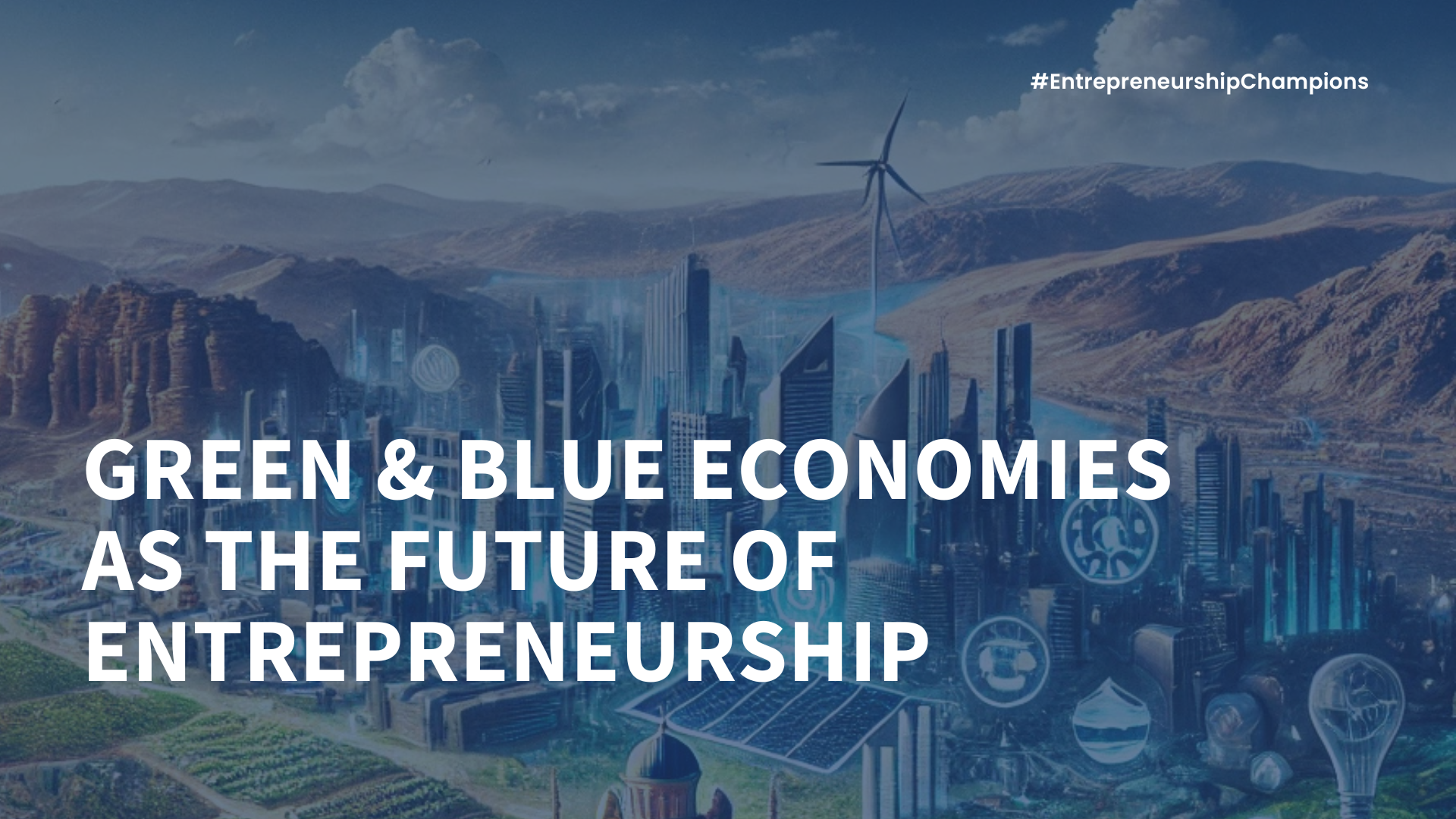
- 24 Nov 2024
In a world increasingly driven by climate action and sustainable development, Jordan is poised to lead the region in sustainable innovation, with abundant solar resources, rich marine biodiversity in the Gulf of Aqaba, and progressive environmental policies. Green and blue economies, which emphasise sustainability and resource efficiency, present immense opportunities for Jordanian entrepreneurs to drive renewable energy solutions, promote eco-tourism, and support marine conservation. These sectors not only address global and local challenges but also position Jordan as a pioneer in sustainable innovation.
As Jordan seeks to build a sustainable future, the National Entrepreneurship Policy 2021–2027 offers a crucial framework to support green and blue ventures, creating an environment where sustainable entrepreneurship can thrive. This policy not only aligns with Jordan’s commitment to economic modernisation but also with global sustainability goals, positioning the nation as a regional leader in innovation.
As Jordan navigates its economic modernisation vision for 2033, green and blue entrepreneurship can become the foundation of its journey toward innovation and prosperity.
A Nation Committed to Sustainability
Jordan’s commitment to sustainability is reflected in its National Green Growth Plan (2021–2025), which prioritises renewable energy, sustainable agriculture, and eco-tourism. Renewable energy now constitutes 29% of the energy mix—an impressive increase from just 2% in 2015, according to the Jordan Renewable Energy and Energy Efficiency Fund (JREEEF). This growth has not only reduced environmental impact but also created economic opportunities, particularly in rural communities.
Aqaba, the heart of Jordan’s blue economy, exemplifies these efforts through marine conservation policies that support sustainable aquaculture and eco-tourism. By aligning such initiatives with the Economic Modernization Vision 2033, Jordan demonstrates its commitment to establishing an environmentally responsible business environment.
While Jordan has made impressive progress, particularly in renewable energy, there remains untapped potential in solar and wind energy. Compared to regional leaders like Morocco, where renewable sources account for nearly 40% of the energy mix, Jordan is well-positioned to further leverage its abundant solar and wind resources. Doing so could solidify its standing as a regional and global leader in sustainability.
Entrepreneurship Leading the Way
Jordanian entrepreneurs are driving sustainability through innovation. For instance, Green Energy Pioneers, an iPark-supported startup, develops solar energy solutions that contribute to Jordan’s goal of sourcing 50% of its energy from renewables by 2030. Such initiatives reduce reliance on fossil fuels while creating affordable energy options for communities.
In the blue economy, initiatives like ProjectSea, a marine conservation effort, blend biodiversity preservation with sustainable consumerism. This project engages the local community to promote eco-friendly practices and support marine conservation in Aqaba, demonstrating how innovation can support environmental stewardship while benefiting local livelihoods.
These initiatives are more than business successes—they are proof that sustainable entrepreneurship is a critical driver of economic resilience and ecological balance.
Challenges on the Horizon
Despite notable progress, several challenges hinder the full realisation of Jordan’s green and blue economy potential. Complex regulatory frameworks, such as overlapping jurisdictions between environmental and energy authorities, create delays and uncertainty for renewable energy startups. Limited access to funding also remains a significant obstacle, even with initiatives like the Innovative Startups and SMEs Fund (ISSF) making strides in addressing financing gaps. Broader accessibility and more diverse funding mechanisms are still needed.
A lack of public awareness about the economic potential of green and blue economies is another critical barrier. Without understanding these opportunities, entrepreneurs and investors may hesitate to engage in or fund sustainable ventures. Addressing this gap requires targeted efforts, such as public workshops, specialised entrepreneurship programs in schools and universities, and collaborations with Entrepreneurship Ambassadors to promote a culture of sustainability.
To unlock its potential, Jordan must prioritise streamlining regulations, expanding funding accessibility, and encouraging widespread awareness of green and blue entrepreneurship opportunities. These targeted interventions will ensure a thriving ecosystem that supports sustainable innovation and economic growth.
The Way Forward
To unlock the promise of green and blue economies, Jordan needs to go beyond existing frameworks. Policymakers, private sector stakeholders, and international partners must collaborate to drive meaningful change. Here are four critical areas of focus:
- Incentivise Sustainability: Offering green bonds, grants, and tax breaks can attract more startups to these sectors.
- Simplify Regulations: Streamlining processes for registering and operating green and blue businesses will reduce barriers for entrepreneurs.
- Educate and Train: Specialised programs can equip aspiring entrepreneurs with the skills to succeed in sustainable industries.
- Strengthen Partnerships: Public-private partnerships and collaboration with global organisations can provide the expertise and resources needed to scale sustainable projects. Cross-border collaborations with neighbouring countries like Saudi Arabia can amplify Jordan’s renewable energy efforts by establishing joint ventures, exchanging expertise, and creating a unified vision for sustainability in the region.
A Vision for the Future
The potential for green and blue economies in Jordan is immense, leveraging the country’s abundant solar energy, marine resources, and entrepreneurial spirit to retain local talent, create jobs, and build resilience against future challenges. For example, renewable energy startups and sustainable aquaculture projects have already begun transforming communities by creating employment and reducing environmental impact. However, realising this potential requires overcoming significant barriers.
The Global Entrepreneurship Monitor (GEM) Report highlights regulatory hurdles and funding gaps as major obstacles to Jordan’s entrepreneurial growth. The National Entrepreneurship Policy 2021–2027 addresses these issues, providing a clear roadmap to foster innovation, sustainability, and economic resilience.
By streamlining regulations, expanding funding opportunities, and promoting sustainable industries, Jordan can position itself as a regional leader in green and blue economies. Entrepreneurs will play a pivotal role in this transformation, driving innovation and creating solutions for a greener, more prosperous future.
With the right strategies and collective effort, Jordan can turn ambition into action and seize its potential as a leader in sustainable innovation. The tools, talent, and vision are already in place—now is the time to act.